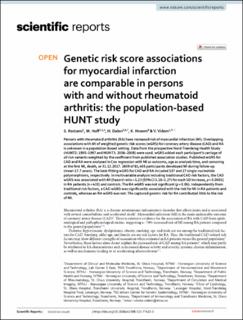Genetic risk score associations for myocardial infarction are comparable in persons with and without rheumatoid arthritis: the population-based HUNT study
Peer reviewed, Journal article
Published version

Åpne
Permanent lenke
https://hdl.handle.net/11250/2727647Utgivelsesdato
2020Metadata
Vis full innførselSamlinger
- Institutt for klinisk og molekylær medisin [3501]
- Institutt for nevromedisin og bevegelsesvitenskap [3200]
- Institutt for samfunnsmedisin og sykepleie [3628]
- Institutt for sirkulasjon og bildediagnostikk [1886]
- Publikasjoner fra CRIStin - NTNU [37957]
- Publikasjoner fra Cristin - St. Olavs hospital [1512]
- St. Olavs hospital [2490]
Sammendrag
Persons with rheumatoid arthritis (RA) have increased risk of myocardial infarction (MI). Overlapping associations with MI of weighted genetic risk scores (wGRS) for coronary artery disease (CAD) and RA is unknown in a population-based setting. Data from the prospective Nord-Trøndelag Health Study (HUNT2: 1995–1997 and HUNT3: 2006–2008) were used. wGRS added each participant’s carriage of all risk variants weighted by the coefficient from published association studies. Published wGRS for CAD and RA were analysed in Cox regression with MI as outcome, age as analysis time, and censoring at the first MI, death, or 31.12.2017. 2609 of 61,465 participants developed MI during follow-up (mean 17.7 years). The best-fitting wGRS for CAD and RA included 157 and 27 single-nucleotide polymorphisms, respectively. In multivariable analysis including traditional CAD risk factors, the CAD wGRS was associated with MI [hazard ratio = 1.23 (95% CI 1.18–1.27) for each SD increase, p < 0.0001] in RA patients (n = 433) and controls. The RA wGRS was not significant (p = 0.06). Independently from traditional risk factors, a CAD wGRS was significantly associated with the risk for MI in RA patients and controls, whereas an RA wGRS was not. The captured genetic risk for RA contributed little to the risk of MI.
